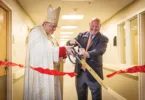by Joe Bollig
joe.bollig@theleaven.org
KANSAS CITY, Kan. — Call it a tale of two Web sites.
They have the same subject, but are diametrically opposed in their view of a certain politician: Governor Kathleen Sebelius.
The first, a project of Catholics United, is Catholics for Kathleen Sebelius, at: www.catholics forsebelius.org.
The second, sponsored by Catholic Advocate, is Catholics against Kathleen Sebelius, at: www. catholicsagainstsebelius.org.
Both sites argue over the governor’s stands on life issues. The first claims Gov. Sebelius is pro-life, while the second claims she is anything but.
Mary Kay Culp, executive director of Kansans for Life, says it’s not even close. In her judgment, the governor is firmly pro-choice. Culp and other Kansas pro-life activists are outraged by attempts to portray the governor as pro-life.
Sebelius has a long history of political opposition to pro-life efforts and support of measures that favored abortion providers, said Kathy Ostrowski, senior lobbyist and researcher for Kansans for Life.
As a state representative from 1986 to 1994, Sebelius voted against several pieces of pro-life legislation, including ones that proposed a parent’s right to consent to a minor child’s abortion, parental notification of a minor’s abortion, a 24-hour waiting period, limiting post-viability abortions, and removing a health exception.
By contrast, she voted for an amendment allowing girls to avoid parental notification, for a bill to codify the 1973 Roe v. Wade decision into Kansas law, and for an amendment to prevent social services agencies from denying coverage of abortion under their medical programs.
In response to her statehouse activities, Archbishop Ignatius J. Strecker wrote in the The Leaven on March 27, 1992, that “Rep. Kathleen Sebelius of Topeka led the death-march of the unborn to the abortion clinics in the House of Representatives.”
As recently as March 6, Archbishop Joseph F. Naumann wrote in The Leaven about his opposition to the appointment of Sebelius to lead the U.S. Department of Health and Human Services because of her record and of his request that she not receive the Eucharist.
“[B]ecause of her long history, both as a legislator and governor, of consistently supporting legalized abortion, and after many months of dialog, I requested Governor Sebelius not present herself for Communion,” said Archbishop Naumann.
“I did this in the hope that it would motivate Governor Sebelius to reconsider her support for what is an intrinsic evil — the destruction of innocent human life by abortion,” he continued. “I also took this pastoral action to protect others from being misled by the governor’s public support and advocacy for legalized abortion.”
During her first run for governor, Sebelius tried to distract from her legislative record with an Oct. 28, 2002, letter targeted to Catholic voters in Topeka.
“I am not pro-abortion,” she wrote. “I will not, and never have, promote abortion. I am a practicing Catholic” and “I feel about abortion just like you do.”
She also said it was “absolutely false” that her campaign had been funded with hundreds of thousands of dollars by a political action committee active on the is- sue of abortion — an oblique reference to abortionist George Tiller’s activities.
Tiller had, however, given generously to Sebelius while she was a legislator and insurance commissioner and in the run up to her gubernatorial campaign. In fact, the last direct contribution from Tiller to Sebelius’ Blue Stem Political Action Committee was in March 2002.
And Tiller continued to give generously to political action committees that, in turn, gave funds to her campaign. Tiller’s fundraising letters do not mention Sebelius by name, but plead support to stop her opponent. There was no one else Tiller’s efforts could benefit but Sebelius.
Later, Tiller would take credit for contributing to Sebelius’ victory and Sebelius would later show her appreciation to Tiller at a dinner at the governor’s mansion on April 7, 2007.
Once she was elected, Gov. Sebelius extended her pro-choice record by vetoing clinic-licensing bills in 2003 and 2005. She vetoed a late-term abortion- reporting bill, and vetoed the Comprehensive Abortion Reform Act of 2008.
Catholics for Sebelius point to pro-life legislation signed by Sebelius, but Culp says there’s more to the story.
“Governor Kathleen Sebelius only signed pro-life legislation when veto-proof majorities were bearing down on her,” said Culp, “or as, in 2005, when she signed two bills less threatening to her supporters in order to use all her political capital to heavily and successfully lobby two Democrat[ic] state representatives to change their votes, and sustain her veto of a clinic licensing bill adamantly opposed . . . by George Tiller.”
Of the small amount of legislation that Gov. Sebelius has signed that her supporters call “pro-life,” none of it has anything to do with abortion clinics, said Ostrowski. In fact, Sebelius blocked attempts to regulate clinics at a time when one Kansas City, Kan., clinic was shut down because it was filthy and vermin- infested.
In 2007, Gov. Sebelius signed the unborn victims of violence bill (Alexa’s Law) — the same kind of legislation she had opposed in 1989.
“In 2007, pro-life legislators managed to attach Alexa’s Law to important crime legislation supported by the governor,” said Michael Schuttloffel, executive director of the Kansas Catholic Conference.
“Rather than veto the entire legislative package that included both Alexa’s Law language and the crime legislation sought by the governor, she signed the bill,” he said.
Some have tried to give Sebelius pro-life credit for signing the Sen. Stan Clark Pregnancy Maintenance Initiative, which funds support services for pregnant women as an alternative to abortion. Schuttloffel calls this claim “Orwellian” in its language.
“In fact, Governor Sebelius’ 2010 budget proposal eliminates the Sen. Stan Clark Pregnancy Maintenance Initiative Program,” said Schuttloffel. “The program was first funded in 2000, before she was governor. In 2004, Governor Sebelius used her line-item veto to eliminate funding for the program.”
Senator Clark tried to organize a veto override, but he failed. Not long after, he died in an auto accident. The following year, the Legislature passed the initiative again, although with reduced funding.
“This the governor signed,” said Schuttloffel. “Whatever her reason for doing so, she is now attempting to get rid of the program. . . . To suggest that she has somehow championed the Stan Clark Pregnancy Maintenance Initiative is outrageous and shameful.”
Another claim is that Gov. Sebelius’ support for adoption tax credits and adoption support and health care reduced abortions in Kansas. Culp said the downward trend began before Sebelius became governor, and that state trends were part of a national decrease.
Governor Sebelius has never offered support or encouragement to the pro-lifers of Kansas, said Ostrowski. She has never communicated support for pro-life legislation in her state of the state addresses nor attended pro-life events or fundraisers.
Sebelius has, however, dined with Tiller and his colleagues, partied with Planned Parenthood, and attended fundraisers to support organizations that promoted pro-choice candidates, said Ostrowski. If Sebelius was as pro-life as her supporters say, Kansas pro-lifers would have noticed. Instead, she has cynically tried to redefine what it means to be pro-life.
Schuttloffel, from the Kansas Catholic Conference, agreed that the governor’s record is clear.
“The fact is, Governor Sebelius’s record of uncompromising support for the most extreme elements of the abortion industry is beyond anyone’s power to misrepresent,” he said. “It is clear. It is unambiguous.”






